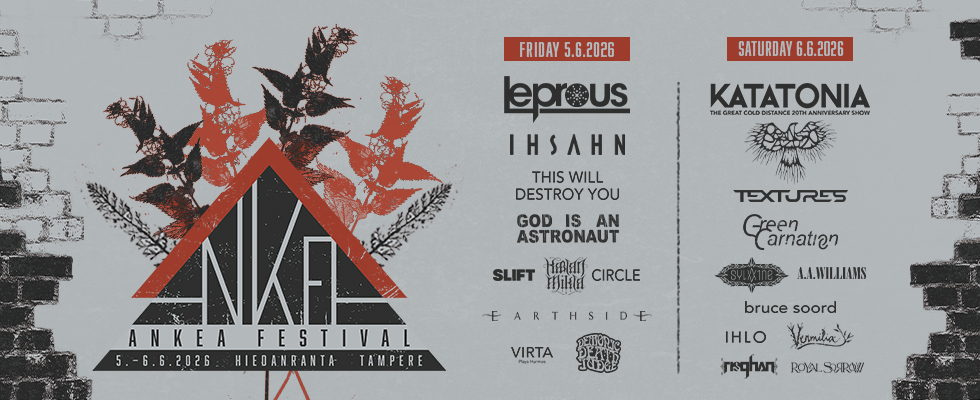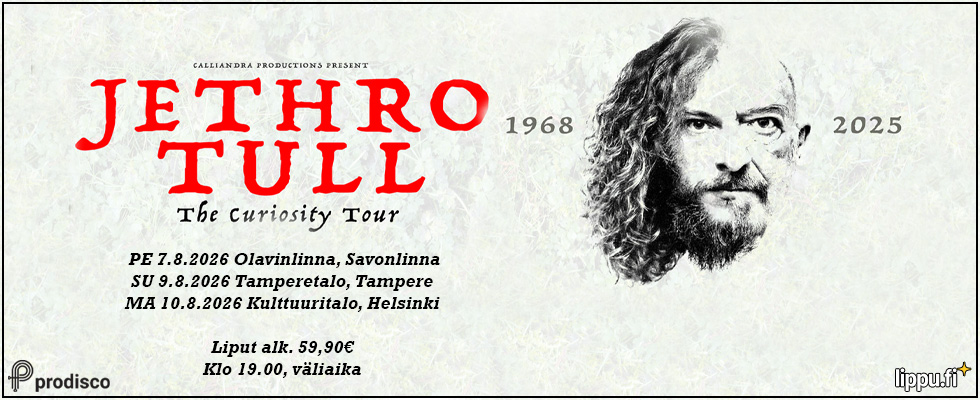Machine Headin Robb Flynn: ”Artistin tehtävä on peilata yhteiskuntaa”
 Yhdysvaltalaisen metallia soittavan Machine Headin laulaja-kitaristi Robb Flynn antoi hiljattain haastattelun Full Metal jackie -radio-ohjelmalle. Kysyttäessä miten mm. Panterasta ja Downista tutun Philip Anselmon aiemmin tänä vuonna aiheuttama natsikohu on muuttanut hänen käsitystään Panterasta, Flynn vastasi:
Yhdysvaltalaisen metallia soittavan Machine Headin laulaja-kitaristi Robb Flynn antoi hiljattain haastattelun Full Metal jackie -radio-ohjelmalle. Kysyttäessä miten mm. Panterasta ja Downista tutun Philip Anselmon aiemmin tänä vuonna aiheuttama natsikohu on muuttanut hänen käsitystään Panterasta, Flynn vastasi:
”Yeah, a lot of conflicted thoughts there. I mean, it was amazing getting the guitar back, you know? Hell, Dimebag gave me that guitar on stage at the Aragon Ballroom in Chicago, Illinois back in 1997. And when it was stolen from me back in 2010, my house got robbed and they ended up getting four guitars and that was one ’em. So to get it back six years later was seriously… you know, I always felt like I’d get it back, but you just… I think at some point I just… you know, it’s not like I’d given up hope, but you just let go; you’ve to move on and you’ve gotta stop… I mean, I’ve probably gotten hundreds of leads about finding it and they’d all just kind of end up nowhere. And, you know, when you finally see those pictures… my buddy Craig [Locicero] sent them to me in an e-mail. He was, like, ’Hey, man, I think Bryan Kehoe over at Dunlop might’ve found your guitar.’ And, I’m, like, ’Hmm, you know, I’ve done this a hundred times now.’ You scroll through the e-mail, and I was, like, ’Holy crap! These are the guitars.’ And, yeah, it was amazing. So [that was] Dimebag looking out for me. You know, the other part of it? You know, it’s crazy, ’cause we were writing this song. We’d had it for a while, and, you know, I felt it was this really great song and I kind of [wasn’t] sure where the lyrics were going, especially my second verse. I felt I had a killer first verse, but then I wasn’t really sure what the second verse was. I sent it off to Dave [McClain], my drummer, and Dave was just, like, ’You know, that second verse just kind of sounds like you’re annoyed.’ [Laughs] ’I’m not hearing that ’pissed-offness’ that I’m used to hearing.’ And he was right. And I just promised him that I’d go in and re-sing the song a couple of days later. And then the day after that, the incident at Dimebash happened. And I went in and sang it a few days later, and I just rewrote everything on the spot. And then I sent it out to him, and he was, like, ’Well, it’s pissed off now.’ You know, there was quite a bit of debate as to whether to keep it, or whether these things needed to be said, but ultimately, maybe the inspiration for it is what made those lyrics come out of it, but then, after I put out the ’Racism In Metal’ video [commentary on YouTube] and it got a million views in four days and I got a thousand death threats, and neo-Nazis groups threatening to disrupt our shows in Madrid [Spain] and Dresden, Germany. If anything, that’s why those lyrics stayed. Because it was so much bigger than that at that point. It went so far beyond where the original idea came from.”
Kun Flynniltä kysyttiin miksi ”Is There Anybody Out There?” -kappale julkaistiin yksittäisenä singlenä sen siijaan, että se olisi säästetty seuraavaa albumia varten, hän vastasi:
”Well, we had this… I wrote this great song. I was super stoked on it, and I was, like, ’There’s no reason that we can’t just put this song out now.’ You know, we’ve just wrapped up, or we’re getting ready to wrap up, a twenty-month tour cycle behind ’Bloodstone & Diamonds’, which was amazing, and we got to go to all kinds of places that we’ve never been before. And, it was amazing. And it’s gonna take us a while to write a record. We’ve got this killer song. You know, ’let’s put it out.’ That’s the thing, to me, that’s the most… A lot of the older guys, they kind of miss the golden age, or whatever you wanna call it, of the music business. I love the way things are now. I love the new music business. I love that you can just put a song up on Spotify and YouTube and iTunes and Apple Music, and everybody can hear it, and everybody can talk crap on the Internet [laughs] and say it’s the best thing that we’ve ever done, or the worst thing we’ve ever done. To me, that’s amazing. And, you know, I was just very excited about the song. I felt like it was something special. I felt like we had something that… you know, it was just a great song. And why wait? Like, we don’t have to wait. We don’t have to put it all on a record and wait ’till it’s a collection of ten songs. And, you know, I talked to the label, the label heard the song, and they loved it. They flipped out, and they were, like, ’We should try and take this to radio. Let’s just put it out as a song.’ And so we did.”
Vastuutaan musiikintekijänä Flynn kommentoi seuraavasti:
”You know, I mean, look, this is the way that I view music. The first band that I flipped out over was BLACK SABBATH. They were probably the band, more than any other, that inspired me to play music and smoke weed and have sex with girls and go just crazy. And I think a lot is made of the more Satanic aspect of the band, but, to me, one of the things that I always loved, and I always respected about them, was that they…. They put their necks on the line and said some crazy stuff. You look at a song like ’War Pigs’, which was an anti-war song at the height of the Vietnam war at a time that was truly not a safe time to say the things that they were saying; there could be severe repercussions for saying that. And they pushed the envelope. And then, even later on, pushing the envelope with songs like ’Sweet Leaf’ and songs like ’Snowblind’ and drug culture and bringing in that kind of an element into the music lexicon, and then take that, and then I got into the thrash metal scene, which was about being as extreme as possible, and then stuff like N.W.A. and hip-hop, like PUBLIC ENEMY, where it was even more about standing up and saying something. And whether you agreed or whether you disagreed, you couldn’t ignore it. Those are the bands that inspired me. Even the punk rock bands that I got into — bands like DISCHARGE — they stood for something. And while I don’t think that everything has to be like that in music, I think ultimately the job of an artist is to hold a mirror up to society. It’s our job to hold that mirror up, and sometimes what we reflect is beautiful, sometimes what we reflect is love, sometimes what we reflect is joy or sex, or whatever. And I think at other times, what we reflect back is ugly and ultimately we reflect back something that needs to be said that oftentimes people are afraid to say. And that even applies to me, the things that I’m afraid to say. Some of the lyrics in this song I was afraid to say; I knew there’d be backlash, [and] there has been a backlash. And does it make me regret it? No. I mean, if anything, I feel like those things need to be said maybe now more than ever.”
Kysyttäessä millä tavoin yhtyeen kohtaamat vaikeudet ovat kehittäneet häntä musiikintekijänä, Flynn vastasi:
”I don’t know if it’s all made me a better musician [laughs], [but] it’s made me a better human. Our first record came out in 1994. We started in 1992. And twenty-five years, coming up on twenty-five years, I think that anything — any relationship, anything that you do in your life — is gonna have ups and downs in a twenty-five-year period, and there’s gonna be changes, and you’re gonna grow, and you’re gonna evolve. And I think that all of those experiences… It’s, like, you need to lose every once in a while so that you can appreciate winning. There’s a saying about [Italian duke and powerful military commander] Cesare Borgia — it’s from a long time ago and [Renaissance philosopher Niccolo] Machiavelli said it. He was talking about Cesare Borgia, and he was the son of the pope, and every battle that he ever fought he won for, like, years and years and years, and then at some point, bad luck came onto him, and eventually he got killed in this battle. And [Machiavelli] was, like, ’Cesare Borgia had the bad luck to have only good luck, and when bad luck fell on him, he had no way of processing it or dealing with it in any way.’ So, yeah, man, I mean, everybody’s life is like that, and everybody has ups and downs, every thing has ups and downs. And they should have ups and downs. That’s what life is. Life shouldn’t just be an endless stream of good. There’s gotta be those good and bad to make things, you know, be in perspective. I’ll tell you what, man. We’ve had it way better than a lot of other bands. We’re still here. We’re still making music. We’re doing better than we ever have in the twenty-five years that we’ve been doing it. And, yeah, it’s all good. And we’re grateful for that; we’re grateful and very appreciative and very lucky for the fans that we have, for the music that we’re able to make, for the people around us that have partnered with us to support us in our oftentimes crazy musical endeavors. Yeah, it’s good.”
Sitä, miten uusi ”Is There Anybody Out There?” -single heijastaa yhtyeen seuraavan albumin lyyristä ja musiikillista teemaa, Flynn kommentoi:
”I’ll tell you, man. I never know where the new MACHINE HEAD record’s gonna go, Jackie. Every time we go to start a record… Oftentimes we’ll have these little pow-wows and talk about, ’Oh, yeah. We wanna do this,’ or, ’We wanna do that,’ and it never happens. Whatever we talked about just… You know, sometimes you just… I mean, all the time, you start writing, and at least when the four of us step in a room, we just try and create. And sometimes we’re getting off on one vibe, and at other times we’re getting off on another vibe. And I think a lot of times… most of the time, there’s just no way to direct it. I don’t feel that you can direct music. You’re just a vessel, and music is coming to you and going through you, and it’s your job to just let it happen. And that’s the hardest thing, I think, for anybody to do as a human being. You wanna control it. You wanna control life, you wanna control how it’s going, and with music especially, it controls you, and it tells you where it’s gonna go. And I use this example a lot: with ’The Blackening’, which is a record that came out about seven years ago; many people loved it. Or actually nine years ago; holy smoke — it’s almost ten years old! [Laughs] Crazy. My math [was] wrong there. It ended up having four nine-minute songs… two ten-minute songs and two nine-minute songs. Those were long songs, and we had never, up until that point, written songs that long. And when we first started writing that record, the first four songs that we wrote were the four shortest songs on that record. ’Now I Lay Thee Down’, ’Aesthetics Of Hate’, ’Beautiful Mourning’ and ’Slanderous’ — all four- or five-minute-long songs. There was no indication at all that we would suddenly pivot and start writing ten-minute songs, but at some point, ’Halo’ came along and suddenly… And one day, after having ’Halo’ for I don’t know even how long… a couple of months… we timed it, and we were, like, ’Holy crap! This song’s nine minutes long!’ We’re freaking out. ’We’ve got two nine-minute-long songs. We’ve gotta trim the fat. We’re crawling up our ass and becoming self-absorbed jerk musicians. So let’s trim it down to five minutes. And we did. So we trimmed all the songs down to five minutes — the long songs — and it was like taking all of the loop-the-loops out of a roller coaster; it just didn’t have that excitement anymore, it didn’t have that thrill anymore. And we didn’t know what our fans were gonna think. We didn’t know if people were gonna dig the direction we were going, but it felt right, and we just went with our gut. And lo and behold, it got nominated for a Grammy, we ended up touring with METALLICA for six months, and it ended up being one of those moments that changed the direction of the band for a while.”
Seuraavan Machine Head -albumin alustavasta julkaisuajankohdasta ja yhtyeen suunnitelmista loppuvuodelle hän kertoi seuraavaa:
”We just wrapped up twenty months of touring — two hundred and eighty-three shows, almost all of which were ’An Evening With Machine Head,’ so MACHINE HEAD just playing two and a half to three hours, and it was awesome. And, you know, we’re putting up this song, because we weren’t quite ready to jump right into the record-writing process. And if the song does what we all think it’s gonna do, we’ll likely do some more touring in September. At the moment, though, there are no touring plans. Like I said, we wrapped up twenty months, and we’re, like, ’All right, let’s take a break here. Let’s just kind of get our heads back together and recharge.’ So we’re just kind of in recharge mode. This is my first summer home in I can’t even tell you how long, and I’m gonna literally sit at the lake and go wakeboarding and drink my body weight in beer every day up there and have a blast. You know, hang out with my family, hang out with my kids, and just enjoy it.”
Koko haastattelun voit kuunnella tästä:



